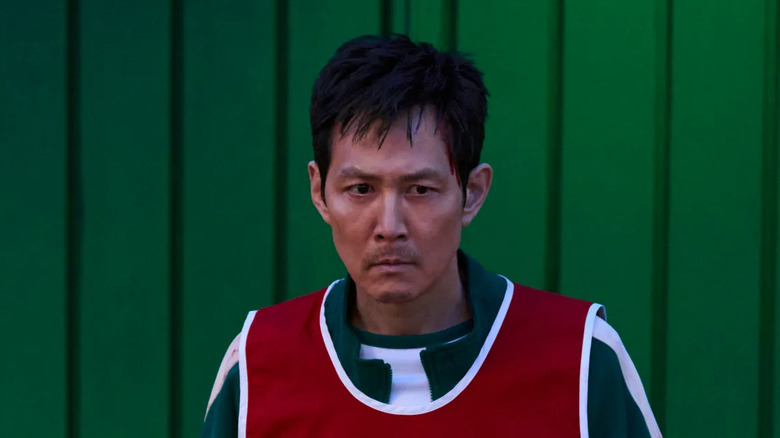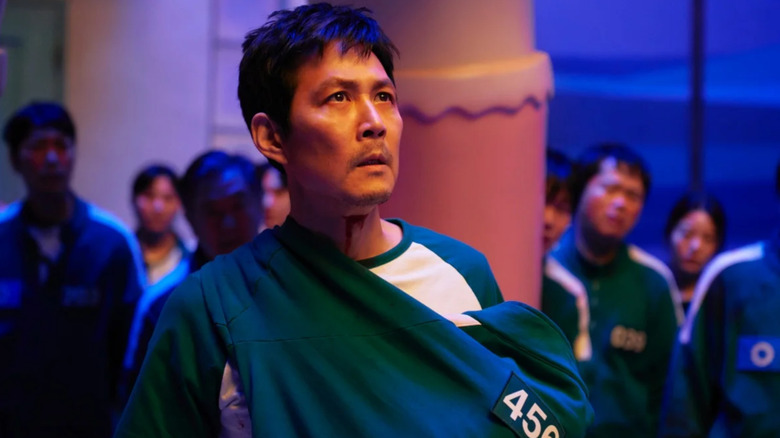Squid Game Season 3: [SPOILER]'s Final Words Explained By The Show's Creator
This post contains spoilers for "Squid Game" season 3.
In one of the saddest moments of the final season of "Squid Game," main character Gi-hun (Lee Jung-jae) sacrifices his own life for Player 222, a newborn CGI baby. The moment makes for a poignant conclusion to Gi-hun's character arc; he goes from a fairly selfish guy in season 1 to someone making the ultimate sacrifice for a stranger in season 3. It also helps Gi-hun win his moral argument against the Front Man In-ho (Lee Byung-hun), as he is proving in his final moments that humans are more than self-serving animals.
The only problem with Gi-hun's final moment is that he fails to make a coherent speech. He's trying to say something profound, but he's too tired and broken to finish the sentence. All he can say is, "Humans are..." before he gives up and plummets to his death. In the recent Netflix feature "Squid Game in Conversation," showrunner Hwang Dong-hyuk shed some light on what Gi-hun was trying to say.
"I wanted to continue with, 'As humans, this is what we should do, as humans, this is how we should be, and starting now, this is how we can turn this world of ours into a better one.'" Dong-hyuk explained. "But as I wrote that all out, it became clear I couldn't sum this up in a single line. People are far too complex to be defined categorically like that."
In the end, Gi-hun didn't need to be all that concise with his final words, as it was his actions that spoke for him. In-ho definitely seemed to understand what he meant, which might be why he went out of his way afterward to make sure Gi-hun's daughter received his fortune. Kang No-eul (Park Gyuyoung) understood him too; she responded to his final moments by deciding to keep looking for her own lost child, despite the odds not being in her favor. Gi-hun pleaded in his final moments for humans to be kinder to each other, and it seems like the other characters listened.
Dong-hyuk chose not to spell out Gi-hun's point, and let the audience infer it for themselves
"If I sent the viewers a message that was so explicit, and so normative and didactic, it would actually only serves to limit the message itself," Dong-hyuk explained about Gi-hun's trailed-off final words. "So I decided the rest of what I wanted to say would instead be expressed physically by Gi-hun through his actions, through his deeds, and the sacrifice he makes to save that child."
It's an approach that displays a healthy aversion to coming across as preachy. If you want to deliver a lesson to your viewers, a writer's best approach is to try to get them to reach that lesson without too much help, so they can accept the message as if they'd thought of it on their own. When you spell the lesson out too clearly, it comes across as condescending, and the audience might reject the lesson out of sheer annoyance.
Gi-hun's actor, Lee Jung-jae, supported the showrunner's approach, noting that it left the audience with far more to talk about after the credits rolled. As he explained:
"If our message was complete, with nothing left to interpretation, then the audience would just leave it at that, then go 'oh, that's how it all ends'. [...] If we had gone that route, the story would've just had one single conclusion but because we left the last part of the message opened ended, it feels like we're continuously communicating back and forth with the audience. So the end's a conversation, we throw you a question: 'This is what I think, but what do you think?'"
"Squid Game" season 3 is now streaming on Netflix.

